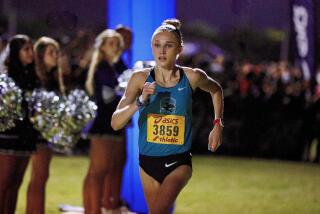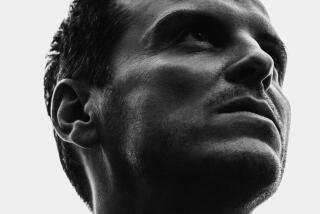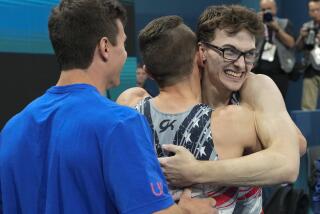Scott moves on well without mile record
- Share via
After Steve Scott’s 25-year-old U.S. record in the mile finally fell two months ago, his friends and colleagues treated him with kid gloves.
“What made it embarrassing,” he says, “is that so many people came up to me and said something like, ‘It’s OK, it’s all right.’ Or they wouldn’t approach me at all because they thought I was upset. I got e-mails, I got phone calls. They were like, ‘Are you sure you’re OK?’ And I was like, ‘I’m fine. It’s no big deal.’ ”
The truth is, as illogical as it might sound, the three-time Olympian and former UC Irvine standout was more disappointed on the July evening he set the record in 1982 than he was on the recent July evening it was broken by Alan Webb.
Scott, who had set the American record twice in the previous year, was actually gunning for the world record that long-ago night in Oslo.
In some ways, the evening was a microcosm of his running career, which in addition to great longevity and notable accomplishments -- Scott was a six-time U.S. champion in the 1,500 meters -- also included its share of heartache.
Says Scott, 51 and eight years into a second career as the men’s and women’s cross-country and track and field coach at Cal State San Marcos in northern San Diego County, “When you think about it, the two pinnacles in running are an Olympic medal and a world record. And I fell just a little bit short in both areas.”
America’s premier miler for more than a decade, Scott was denied a chance to compete in the 1980 Olympics because of the U.S. boycott of the Moscow Games, then finished 10th in the 1,500 in 1984 and fifth in 1988. In 1982, the fastest of his 136 sub-four-minute miles was three-tenths of a second slower than Sebastian Coe’s world mark but would remain the U.S. standard for a quarter-century.
As the years passed, Scott grew to more fully appreciate the effort. He realized the U.S. record was a part of his legacy, like his silver medal in the 1983 world championships, but after awhile he figured he’d held onto it long enough.
“I was actually shocked that it lasted so long,” he says. “Years ago, I was very protective of the record. I didn’t want it to be broken. I wanted to hang onto it forever. But as time went on and I stopped identifying myself as an athlete and started identifying myself as a coach, I realized that me hanging onto the record was not helping to promote track in this country.
“We need new heroes. We need people who are going to get the publicity . . . so therefore if we have good runners representing our country, it’s going to help everybody, including me as a coach. We’ll get a higher level of athlete involved in running, which will help me get better athletes at this school.”
Scott lives in Carlsbad with his second wife, JoAnn. A father of three, he says he was unsure what to do with himself after his running career ended in the early 1990s. His first marriage crumbled and he was diagnosed with testicular cancer.
“Before ‘99, I was definitely floundering,” he says. “From probably 1990 until ‘99, it was a very challenging time. It was the end of my career and pretty obvious I couldn’t run forever, so you’re looking, ‘OK, what am I going to do next?’ It was very frustrating, trying to figure out what I wanted to do and what would provide the same satisfaction that running provided.”
Living in San Diego, he figured coaching was not an option because he was uninterested in leaving the area. He didn’t want to uproot his family.
“But this just fell into my lap,” Scott says of the job at Cal State San Marcos, which competes at the NAIA level. “It was here in San Diego County, where I was living, and it’s 15 minutes from my house. It’s a small school, so I had a chance to grow as a coach as my program grew. It’s just been a perfect situation.”
The men’s cross-country team has reached the nationals every year, the women have missed only twice, and each team has finished as high as third nationally. The women’s track team finished ninth at the nationals last spring.
Through it all, even as memories of his glory days faded, the middle-aged coach and former runner remained the U.S.-record holder in the mile. In 1999, as if weary of it, Scott said of the record, “It’s not something I’d be sad to lose.”
When it finally did fall, he says he felt not a twinge of regret.
“Not at all,” he says. “I identify myself as a coach now. That’s where my goals are, my objectives. I’m trying to win championships, get my athletes qualified.
“I don’t rest on past laurels.”
--
More to Read
Go beyond the scoreboard
Get the latest on L.A.'s teams in the daily Sports Report newsletter.
You may occasionally receive promotional content from the Los Angeles Times.






